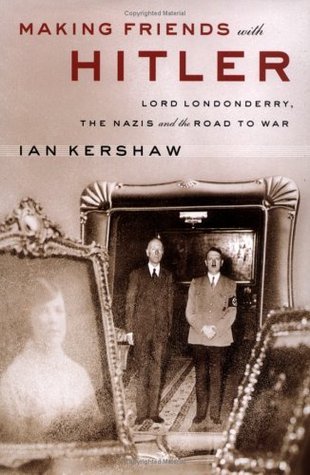What do you think?
Rate this book


488 pages, Hardcover
First published September 24, 2004
What a fine and brilliant history book! And what a far cry from the deadly boring assemblages of facts, dates, and names that immunized us against history at school.
In the words of Ian Kershaw:
Lord Londonderry was brought up to regard wealth, privilege, and power as a birthright. And so, throughout his life, he did. Carrying the weight of family expectations, he wanted to achieve great things.
Kershaw uses Londonderry as a vehicle to walk us through the emergence of Nazism and the decisions facing the British leaders in the 1920's and 30's, when the vast majority of the British people desperately wanted to avoid another great war. Thanks to his cousin, Sir Winston Churchill, Londonderry, who was an aviation enthusiast, was appointed Secretary of State for Air in late 1931. He saw the importance of air warfare and bombing to Britain's future defense, and actively lobbied for strategic investment, but an arrogant and undiplomatic remark saw him lose that position, to his great shame and humiliation, thus ending his ability to promote rearmament. He was, however, always credited with initiating the development of the strategically vital Spitfire and Hurricane fighter aircraft.
Londonderry was both a great British patriot and an admirer of Germany, but was never a British Fascist or Nazi, like Sir Oswald Mosley. He saw an opportunity to become an amateur diplomat, using his aristocratic credentials to forge friendships with the German leaders that would, as he saw it, help avoid war. He and Lady Londonderry, ever his supporter and partner, visited Germany several times, and invited the German leaders to visit them at Mount Stewart, in County Down, Northern Ireland, and their enormous mansion in London. They were not alone among British leaders in being impressed by Hitler, Göring, Ribbentrop, and other Nazi leaders. It never occurred to Londonderry that a gentleman would lie or deceive, and only when the Nazis invaded the remaining (non-Sudetenland) part of Czechoslovakia did they realize how completely they had been taken in. Of course, none of the Nazis were gentlemen, even if they did hunt.
In the meantime, Londonderry had acquired a reputation of being an apologist for Germany, or at least a fool, and when the tide turned and his efforts came to nothing he was entirely absent from the halls of power. The rest of his rather sad life was spent in trying to find ways to salvage his damaged reputation by stating and restating the worthiness of the positions he had taken, by condemning any and all of the British leaders and particularly the Foreign Office, and generally making a great nuisance of himself. We learn so much about this man, but at the same time acquire a deep knowledge of the history and players of this dark time. What an intense and fascinating tale.
Hitler never deviated from the plan that he laid out in Mein Kampf, written in prison after the Beer Hall Putsch of 1923. He wanted to entirely cleanse Germany of Jews. It seemed to me that that plan, amply confirmed by the cruel treatment and murder of Jews in Germany and Austria, should have been enough to set Great Britain, France, the British Dominions, and the United States into planning for war. There was no excuse. No one thought that Jews were worth fighting for or even accepting them in large numbers when Germany was trying to force them to emigrate. If the great democracies had responded with decency and courage in the 1920s, the Nazis would not have been able to rearm and establish an almost unstoppable juggernaut. And the cruelties and inequities of the Treaty of Versailles could have been addressed before Hitler became so powerful that he could simply ignore it.